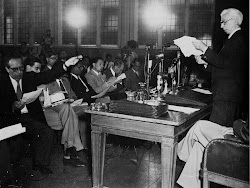British Library audio available of interviews with Joseph Rotblat about his life and experiences. Note the link here to additional audio - an excellent resource for those interested in the Pugwash history.
http://www.bl.uk/voices-of-science/interviewees/joseph-rotblat/audio/joseph-rotblat-the-moral-dilemmas-of-working-on-the-atom-bomb
Tuesday, 3 December 2013
Tuesday, 6 August 2013
Joseph Rotblat’s Memories of 6 August 1945
"The first inkling that I had that the [Manhattan] project was successful in the sense that it achieved what it wanted to achieve was on the 6th of August 1945. I can remember very well. It was a Monday, a bank holiday in England, and I came back from being away and I switched on the radio at 6:00 in the evening and there was the announcement that we had dropped the bomb on Hiroshima. And so I knew from this that what were before purely theoretical speculations turned out to be reality. To me it was a great shock because, for one, I still had some faint hope that maybe all these theoretical calculations would turn out to be wrong and the whole thing would be a fizzle, and secondly, I thought even that if it were successful that it would not be used against populations, but rather as we used to discuss before I left Los Alamos, to try to demonstrate to the Japanese the acquisition of the new type of weapon and get them to agree before it should be used on populations. Both of these hopes, albeit faint hopes, were completely turned out to be wrong. And then I was of course also very much afraid about what was going to happen because I was very much influenced by my discussions in the previous summer, 1944, at Los Alamos with Neils Bohr, the famous Danish physicist… he foresaw that this was going to lead to an arms race. … I knew also at that time, that the atom bomb that was used on Japan was the first step in nuclear weaponry. Because in the office next to me was Edward Teller who was not actually involved in the work on the atom bomb itself. He already at that time worked on the super project, the hydrogen bomb. One of Teller’s helpers was also a Polish man and therefore we used to talk to each other in Polish. I knew a little bit more than other people about what was going on. So I knew that it would begin an arms race and that the hydrogen bomb would come in. And then, remembering what Bohr was saying, I was very much…for the first time I became worried about the whole future of mankind. Because I knew that…once you are going to develop these huge weapons, where are you going to stop? And this was my reaction on the 6th of August.”
[Source: Personal interview with Sandra Ionno Butcher, Washington, DC, 13 July 2003. The photo is a picture of paper cranes made by children in Japan and given to Joseph Rotblat.]
Subscribe to:
Posts (Atom)


